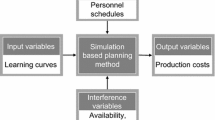Abstract
Today’s manufacturing planning methods usually focus on the technical components of a production system. Up to now, a systematic integration of individual skills of the production workers is not further considered, even though it bears high optimization potentials. This is critical especially for knowledge-intensive production processes (e.g. specialized vehicle construction) characterized by a high amount of variable and manual work steps to be performed. Even in such cases the influence of the competencies to the operational targets is not sufficiently taken into account. Against this background, a method has been developed allowing the systematic integration of person-specific competencies for process planning. The method was evaluated with a simulation model of a workshop production. The results illustrate that a systematic competence-enhancing planning leads to additional costs in short-term due to the higher effort for the training of production personnel “on the job”. On the other hand, the long-term benefits of a competence-based process planning for workshop production were calculated by a Break-Even-Point. “Economies-of-skills” characterizing the resulting increased flexibility and greater work efficiency of the working personnel could be demonstrated.










Similar content being viewed by others
References
AlGeddawy T, ElMaraghy H (2011) Manufacturing systems synthesis using knowledge discovery. CIRP Annals Manuf Technol 60:437–440
Bilsing A (2007) Kennzahlengestützte Bewertung der technologischen Leistungsfähigkeit der Fertigung im Werkzeug- und Formenbau. Dissertation, Rheinisch-Westfälische Technische Hochschule Aachen
Fu J (2002) Planungsarbeitsräume als Grundlage zur Arbeitsplanung und fertigungsgerechten Konstruktion. Dissertation, Universität Karlsruhe
Gerken H (2000) Management von Erfahrungen mit einem Assistenzsystem für die Arbeitsplanung. Dissertation, Universität Karlsruhe
Hämmerle E (1993) Werkstattorientierte Systeme zur Arbeitsplanung und kurzfristigen Fertigungssteuerung. Dissertation, Universität Bremen
Kanning UP (2004) Standards in der Personaldiagnostik. Hogrefe Verlag, Göttingen
Mansfield B, Mitchell L (1996) Towards a competent workforce. Gower Publishing Limited, Hampshire
Mayrhofer W, März L, Sihn W (2011) Planning assistance for pearl chain forecasts and personnel assignment planning of sequenced assembly lines. CIRP Annals Manuf Technol 60:481–484
Mehnert J (2004) Gestaltung und integration von Arbeitsplanungskompetenzen für hierarchielose Produktionsnetze. Dissertation, Technische Universität Chemnitz
Pindyck RS, Rubinfeld DL (2005) Mikroökonomie. Pearson Education Deutschland GmbH, München
Prasch MG (2011) Integration leistungsgewandelter Mitarbeiter in die variantenreiche Serienmontage. Dissertation, Technische Universität München
Randall R, Ferguson E, Patterson F (2000) Self-assessment accuracy and assessment centre decisions. J Occup Organ Psychol 73:443–459
Steiner R (2006) Kompetenzzellenbasierte Produktentwicklung, Dissertation. Technische Universität Chemnitz
Wang L, Feng H-Y, Song C, Jin W (2009) Function block design for adaptive execution control of job shop machining operations. Int J Prod Res 47 (12): S3413–3434
Willms H (2008) Methodisches system zur Auslegung von kostenoptimalen und prozessstabilen Fertigungsverkettungen, Dissertation, Rheinisch-Westfälische Technische Hochschule Aachen
Witzgall E (2010) How does competence measurement with CM ProWork relate to the European qualification framework? Considerations and practical experiences with regard to worker competencies. Professional Training Facts, Dortmund, Seiten 1–11
Witzgall E (2010) Kompetenzdarstellung mit dem CM ProWork-Tool: Möglichkeiten und Ergebnisse der Einordnung in den Europäischen Qualifikationsrahmen. Dortmund, Seiten 1–20
Acknowledgments
The authors would like to thank the German Research Foundation in the framework of the project “Integrated technology-and competence-based work planning in socio-technical systems”, grant number: DE 447/65-2 and the European Regional Development Fund (EFRE) in the framework of the project “Use of modern CAx Technologies in SMEs—From the design to the component” for the support.
Author information
Authors and Affiliations
Corresponding author
Rights and permissions
About this article
Cite this article
Denkena, B., Charlin, F. & Merwart, M. Competence-based process planning for the workshop production. Prod. Eng. Res. Devel. 7, 299–308 (2013). https://doi.org/10.1007/s11740-013-0453-7
Received:
Accepted:
Published:
Issue Date:
DOI: https://doi.org/10.1007/s11740-013-0453-7




